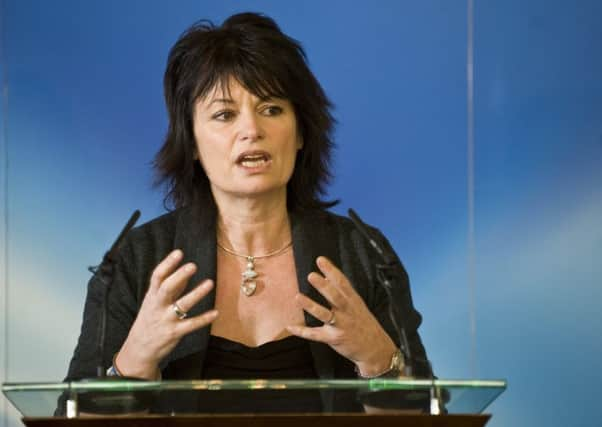Dame Anne leads charge for women at top of science


Dame Anne Glover, as a woman at the top of her game, admits that she has had to bang the table to be heard.
But the former chief scientific adviser to the President of the European Commission is adamant that it must not be that way.
Advertisement
Hide AdAdvertisement
Hide AdDame Anne is now back at Aberdeen University after leaving her Brussels post amid some controversy over her views on GM crops.
She is now vice-principal of external affairs and dean of Europe at the institution where she spent much of her professional life researching and lecturing before joining the Scottish Government as their top scientific mind in 2006.
Her work now is on many fronts, not least pushing the profile of Scotland’s achievements in science, technology and engineering - and supporting women to reach the height of their career potential.
“I think everyone benefits from women getting a bigger place at the table,” she says. “If we reduce barriers and make science, technology and engineering more accessible, it’s good for women and it’s good for men.
“I have seen the benefit of having a diverse laboratory. It is more creative when women are involved.
“Speaking generally, in laboratories I have seen men with big ideas, coming up with overall concepts, but they didn’t necessarily deliver the detail. Women can be good at narrowing the idea and getting the detail that’s needed to give it credibility.
“Separately, they could do good stuff but together they were impressive.”
Dame Anne, 59, believes mixed workplaces are also more productive, particularly in “challenging and difficult” areas.
Advertisement
Hide AdAdvertisement
Hide Ad“This is not evidence-based, but maybe men were less aggressive when women were saying things that allowed people to contribute more and come to a consensus.
“I have been very struck by that. Let’s not ask women to change to fit in to the workplace, let’s make the workplace change.”
She has her own “discipline” when recommending people for jobs to ensure that women were given fair opportunity to access the top posts.
“I will always propose excellent people but I have a discipline that if I am thinking of putting forward a man, I will always propose a woman as well. That is quite a good discipline.
“It’s very easy to think of a good man, they are around everywhere. But we should all make a big effort to think ‘Is there an excellent woman who can do the job as well?’.”
Dame Anne was appointed by Jose Manuel Barroso, president of European Commission from 2004 to 2014, who created the chief scientific adviser’s role. During her time, she gave a scientific perspective on policy and set up a number of bodies to join up thinking amongst the top scientists in member states.
Her departure from Brussels coincided with the end of Barroso’s reign and the handover to Jean-Claude Junker, who did not continue with the post created by his predecessor.
Her exit was widely linked to her stance on GM crop technology - which she believes is safe - and the subsequent backlash from lobby groups such as Greenpeace who claimed that having a sole scientific adviser concentrated too much influence in one person.
Advertisement
Hide AdAdvertisement
Hide AdDame Anne claims much of the reporting around the matter has been inaccurate, with a “whiff of anti-EU” in the coverage.
She is now looking at how to raise the profile of Aberdeen University on an international level, using her contacts both in Europe and beyond.
“I don’t know if it is the individual scientists, or it’s our institutions, but our ambition seems less than our talent,” she says.
“We have so much to offer and I don’t get the feeling that a lot of our citizens really understand that we’re really world-beating.
“We should have an ongoing sense of pride and be able to say, ‘Wow, we’re really good at this’. For young people, that gives them real potential and opportunity.
“I was always referred to as the ‘Scottish Scientist’. It was others who decided to call me that because they thought it was a good description, a positive description. Particularly being in Brussels around the referendum, it was quite interesting to hear what the conversation was about Scotland. It was interesting hearing how they saw Scotland .
“It made me realise just how admired we are.”